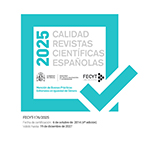Propiedades psicométricas del Cuestionario Goratu “Percepciones sobre las personas con discapacidad intelectual” en alumnado de Educación Secundaria Obligatoria y Bachillerato
Resumen
INTRODUCCIÓN. En esta investigación se analizan las propiedades psicométricas del Cuestionario Goratu “Percepciones sobre las personas con discapacidad intelectual” en una muestra no probabilística de 414 estudiantes de Educación Secundaria Obligatoria y Bachillerato, procedentes de 5 centros educativos privados concertados. MÉTODO. Los cuestionarios fueron aplicados durante el periodo 2017-2019 en 15 aulas. Para la elaboración del cuestionario, se realizó una exhaustiva revisión bibliográfica y se identificaron áreas de indagación a partir de narraciones vitales de 8 personas adultas con DI. Se halla su fiabilidad a través del coeficiente a de Cronbach y su validez mediante un análisis factorial exploratorio aplicando el método de componentes principales para la extracción de factores y un posterior análisis factorial para determinar el número óptimo de dichos factores. RESULTADOS. El Cuestionario Goratu consta de 5 dimensiones con un total de 15 ítems, que explican el 52.92% de la varianza y cuenta con un índice de fiabilidad aceptable (a=.719). DISCUSIÓN. Los resultados psicométricos han sido adecuados al obtenerse valores superiores o iguales a las recomendaciones que deben satisfacer los instrumentos diseñados para la evaluación de realidades sociales. Por ello puede considerarse un instrumento útil para conocer la percepción del alumnado en relación con las personas con DI. El estudio plantea algunas limitaciones como el tamaño y características de la muestra, así como la pertinencia de un posible análisis confirmatorio.
Descargas
Descarga artículo
Licencia
La Revista Complutense de Educación, para fomentar el intercambio global del conocimiento, facilita el acceso sin restricciones a sus contenidos desde el momento de su publicación en la presente edición electrónica, y por eso es una revista de acceso abierto. Los originales publicados en esta revista son propiedad de la Universidad Complutense de Madrid y es obligatorio citar su procedencia en cualquier reproducción total o parcial. Todos los contenidos se distribuyen bajo una licencia de uso y distribución Creative Commons Reconocimiento 4.0 (CC BY 4.0). Esta circunstancia ha de hacerse constar expresamente de esta forma cuando sea necesario. Puede consultar la versión informativa y el texto legal de la licencia.











